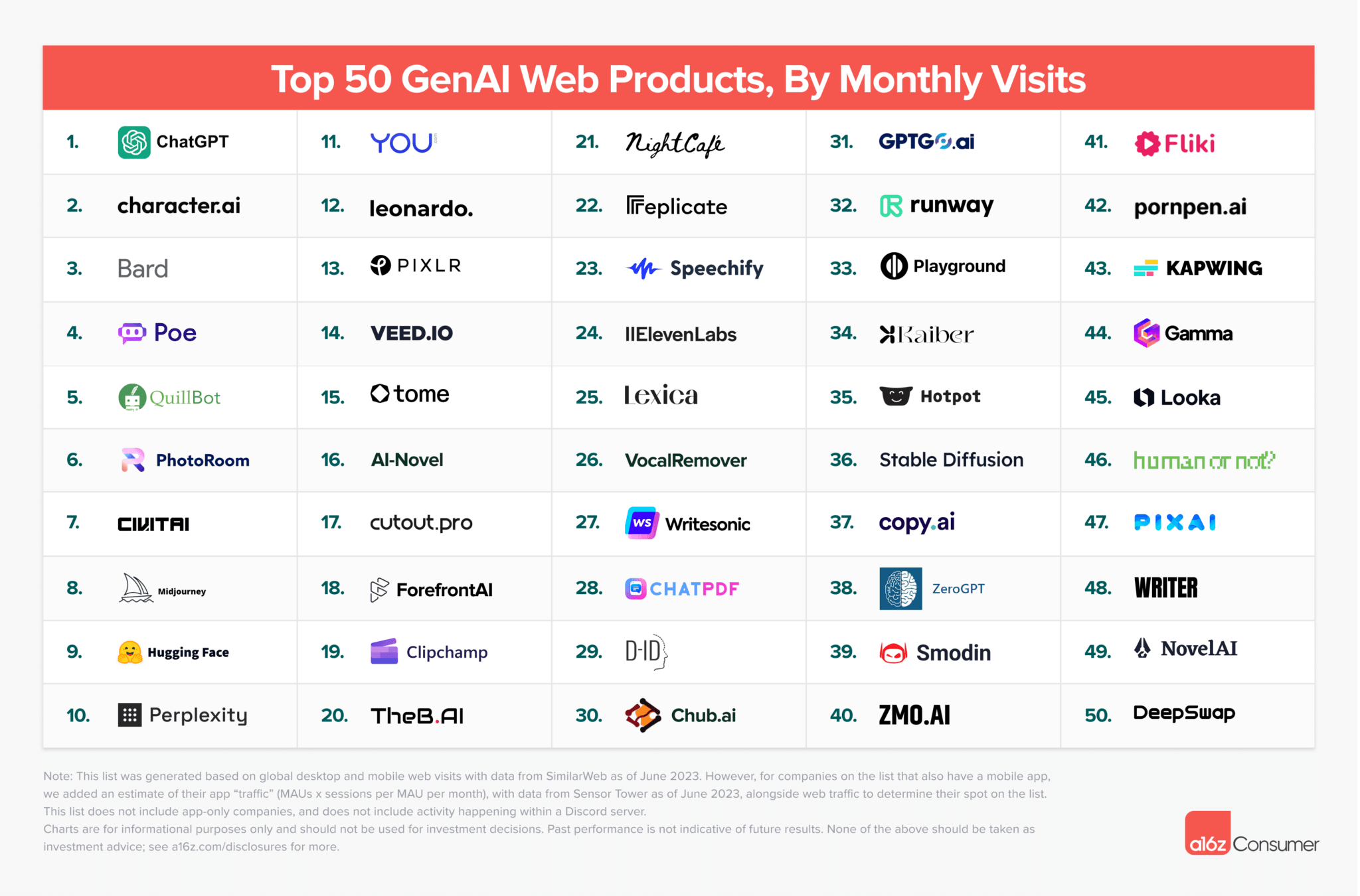Andreessen Horowitz, the VC firm also known as A16Z, published a report today, showcasing the top fifty generative AI products based on the traffic to their websites and mobile apps. The company utilized data as of June 2023 from SimilarWeb to analyze website traffic and Sensor Flow for mobile app traffic. The list was created by first qualifying the companies using their web traffic and then adding the mobile app traffic to the companies that made the list.
The firm created the list to address questions such as how consumers are engaging with generative AI products, which categories incumbents dominate, and where new companies are making breakthroughs.
Since the data is from June, the rankings may have shifted slightly based on more recent information, but it still provides a good overview of the overall landscape.
Here’s the complete list.
(If you enjoy reading this, you might also like Highest-valued AI startups in the world, by AIbeat).

1) As anyone could guess, ChatGPT which was launched in November last year, ranks first. The AI chatbot by OpenAI had quickly grown to become the fastest consumer app to get to 100 million users at the time. The usage for OpenAI, at least in terms of website visits has dropped over the last three months but it still receives over 1.4 billion visits every month, making it one of the most visited websites in the world. ChatGPT runs on GPT-3.5 and GPT-4, OpenAI’s latest AI models.
2) At number two is CharacterAI, the website that enables users to engage in conversations with characters inspired by fictional or real individuals, regardless of whether they are currently alive. Anyone can create characters on the website and interact with any character available on the platform individually or in group chats featuring multiple characters.
Notably, CharacterAI stands out as one of the few products on the list that has garnered a substantial portion of its traffic through its mobile app. The platform’s recently launched mobile apps collectively account for approximately 46 percent of the total traffic, according to the data quoted in the report by A16Z.
3) The third position is with Bard, the AI chatbot by Google that was launched earlier this year. It runs on Google’s latest large language mode Palm 2. Google is reportedly planning to introduce its newer model, Gemini, later this year, and it is anticipated that Bard will be powered by Gemini following its launch.
The chatbot received a significant update in July after its launch in early 2023. This update introduced several new features, including the ability to use images in prompts. Additionally, the chatbot expanded its language support by adding 40 new languages and extended its availability to users in Europe.
4) At number four is Poe, a platform by Q&A website Quora that essentially enables people to chat with chatbots built on different large language models, including GPT-3.5 and GPT-4 by OpenAI, PaLM by Google, Llama 2 by Meta, and Claude by Anthropic. The platform was launched in December of the previous year and became publicly available in February of this year.
5) QuillBot, an AI-powered writing tool that helps users, mainly students, paraphrase writings, ranks fifth. The tool, built and operated by Course Hero, a US-based online tutoring website, was launched in 2017. Among the first five products, QuillBot is the oldest, while all the other products have been launched within the last twelve months.
As the data is from June, the ranking would be slightly different based on the latest data but it still gives a good idea of the overall landscape. The positions as highlighted by some users on X (formerly Twitter) would be slight differnet now.






